
Recent events in Ukraine have brought widespread shock – including in the markets, which initially dipped after hearing about the Russian invasion. The 24/7 media coverage often focuses on the increased short term volatility, of companies, stocks, bonds or commodities, which is the result of new information arising which impacts prices, until ‘new’ news brings about further adjustment. At times like this, we strongly encourage you to stick with your long-term financial planning strategy, and trust markets to work on your behalf. Avoid making short-term investment decisions, as volatility is always in the markets.
As a form of context, below we look at some historical examples of how markets react to war, and whether this affects the longer term growth trend.
What is happening in Ukraine?
Events are moving quickly in the region. At the time of writing, Russia had invaded Ukraine 13 days prior – receiving widespread international condemnation. At least 2m refugees have fled so far, and Ukrainian forces have put up fierce resistance despite being hugely outnumbered.
The US, UK and EU have responded with heavy sanctions on Russia, which has refused to open its stock market. Both US and UK imports of Russian oil have now been banned, leading to further global rises in energy prices as supply struggles to meet demand.
So far, the invasion has not sparked a sustained dip in global stock markets – although it is adding to existing inflationary pressures in the Western World.
Historical precedence
The impact of war on stock markets is not universal. It is complex and varies depending on the players, motives and actions concerned. The Swiss Finance Institute, for instance, published research on the US stock market since WWII and found that stock markets tend to fall in the “pre-war” phase (when uncertainty about the conflict prevails), but usually rise once war breaks out. The explanation is unclear, but perhaps partly this is because war typically creates the new, defining narrative for a nation, its markets and investors.
Wars can bring short-term “shocks” to markets. The S&P 500 fell -3.8% in one day after the Pearl Harbor attack in 1941, and the North Korean invasion of the South in 1950 led to a -5.4% one-day fall. However, most of these shocks tend to recover well within a year.
The Russo-Ukraine conflict and your financial plan
Russia is the world’s 3rd biggest exporter of oil and the 2nd biggest supplier of natural gas. Any sanctions, therefore, are likely to drive up global energy prices. Already, in the UK we are facing higher inflation, so this plausibly means higher fuel and utility bills in 2022. Moreover, Russia provides 35% of the world’s palladium and 9% of its platinum. These precious metals are used in cars for catalytic converters. So, sectors such as the automotive industry (where we have already seen high inflation) could see further price increases for customers due to more limited supply.
With all this said, be careful not to try and “time” commodity markets or build your investment strategy around conflicts (since their effects on markets are typically short-lived). Consider, for instance, that during the US War in Afghanistan (2001-2021) markets were volatile but those who committed to an S&P 500 index fund may have seen returns as high as 300% in that time (averaging 15% gains per year).
Currently, oil and gold prices are soaring and many investors are tempted to take advantage. However, prices are moving constantly and things may take a sharp turn at any moment. Be vigilant to stick to your long-term strategy agreed with your financial planner, rather than taking needless risks with your investments. Remember, frequent active buying and selling in your portfolio can ramp up fees and has not been proven to increase returns compared to focusing on a “buy and hold” strategy.
The current conflict in Ukraine is coming at a humanitarian cost. It is also having big repercussions for the global economy. We all hope for a swift and peaceful resolution and it has been truly inspiring to see the efforts of every day people, charities and aid organisations.
Markets have been through many conflict-related events in the past such as the Cuban Missile Crisis, the 2003 Iraq War and the Arab Spring (2011). In the long term, growth is the long term trend. There is no reason to suggest the current conflict – although deeply distressing – in terms of the markets, is any different.
This content is for information purposes only. It should not be taken as financial or investment advice.


